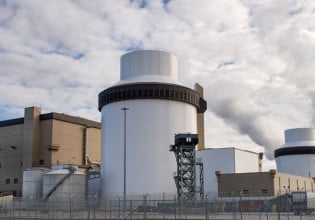ABB Invents High-Efficiency Propulsion System Inspired by Whales
The shipping technology achieves a 22% improvement in energy consumption.
For as long as man has observed nature, we have taken inspiration from it to harness its powers, which has been illustrated countless times throughout history. One famous example is the Wright Brother’s study of birds, where biomimicry–the copying of nature–led to the invention of the airplane.
Dynafin propulsion technology. Image used courtesy of ABB
Now, researchers from Swedish company ABB are using biomimicry to solve emissions issues in the shipping industry. ABB has created a high-efficiency ship propulsion system inspired by the movement of whales.
Shipping and Global Emissions
The global shipping industry is undoubtedly one of the most important, accounting for about 90% of worldwide trade. However, as the world becomes more dependent on the industry, shipping is an increasingly large contributor to global greenhouse gas emissions.
While container ships are more energy efficient than a standard car or train, there are still reasons why shipping significantly impacts the environment.
The shipping sector’s CO2 emissions are continually increasing. Image used courtesy of xChange
The first reason is that most conventional ocean liners today run on diesel - a non-renewable energy source contributing to emissions when burned as fuel. The second reason is the long-distance nature of their travel and the amount of field required to reach these ranges. On average, container ships can hold up to 2 million gallons of fuel. Finally, the global shipping demand is so great that ships continually traverse the oceans with little to no downtime between shipments. Because of these reasons (i.e., the massive scale of the shipping industry), the shipping industry inherently consumes an inordinate amount of fossil fuel and hence contributes greatly to greenhouse gas emissions.
Today, it is estimated that the shipping industry accounts for ~3% of the world’s global greenhouse gas emissions annually and is predicted to reach 13% by 2050 if no intervention is taken. To ensure a cleaner future, we need a more sustainable shipping method.
Addressing Shipping Industry Sustainability Challenges
To address the sustainability challenges associated with the shipping industry, ABB has recently developed a solution called Dynafin, a ship propulsion technology inspired by the movements of a whale’s tale. Dynafin consists of a single main electric motor that rotates a large wheel ranging from 30 to 80 RPMs. Attached to this rotating wheel is a series of vertical blades which extend directly into the water. Each blade has a motor to change its angle and rotate as needed.
Together, the cumulative motion of the wheel and blades results in a system that simultaneously creates propulsion and steering for a ship. According to an independent study, the Dynafin solution was shown to unlock a 22% improvement in propulsion energy consumption compared to conventional maritime shaft line solutions.
Because of these encouraging results, the ABB team believes that their Dynafin concept can be a major key to significantly reducing the global greenhouse gas emissions caused by the shipping industry. Dynafin will be available in units ranging from 1 to 4 MW and targeted for medium-sized to smaller vessels.








